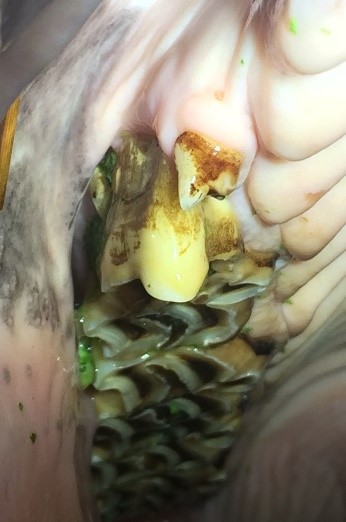
During this period, it is vital that regular dental checks are performed, ideally every six months, but at least annually.
Wolf teeth, the vestigial first premolars erupt at about nine to twelve months of age and may cause discomfort when biting a young horse. In those animals where these teeth are present, we routinely extract them at the first dental check or in the case of geldings whilst the horse is under anesthetic for castration. Contrary to popular belief Wolf teeth do have nerves and should only be extracted surgically after regional local anesthesia.
Deciduous teeth, like their adult counterparts may develop very sharp enamel points on the outer edges of the upper cheek teeth and the inner edges of the lowers, leading to ulceration of the cheeks and tongue. Hooks, ramps and excessive enamel ridges may also be present.
As the permanent incisors and premolars develop and erupt, the overlying deciduous tooth is eroded away until only a remnant or cap is left in place. Under normal circumstances this cap falls off, exposing the developing tooth which continues to erupt until in full wear after six months. Where these caps are retained or impacted, serious discomfort and occasionally infection can occur. Long term retention of caps will lead to disruption of the opposing tooth, uneven chewing surfaces and even long-term malocclusions. In some cases, the developing tooth will erupt alongside the deciduous one, requiring extraction before the permanents are pushed out of alignment.
By performing regular dental checks, we can prevent the above issues from arising.
For anyone involved in training young horses it is imperative that the biting process is comfortable for the animal from day one. As we are all aware horses quickly create associations with painful or frightening stimuli and these associations can be long lasting!
We offer a full veterinary dental service at all our clinics across Hawke’s Bay, Dannevirke, and the Wairarapa.
Dave Kruger




